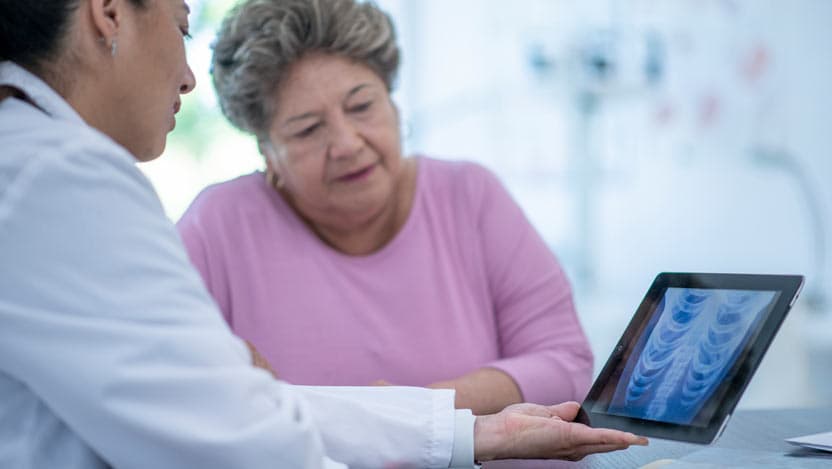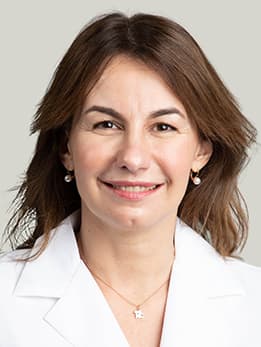New research leads to better outcomes for lung cancer patients

Marina Chiara Garassino, MD, is an internationally recognized expert in the treatment of lung cancer and other thoracic malignancies. Before joining the University of Chicago Medicine as a professor in the Department of Medicine and Director of Thoracic Oncology, she led the thoracic medical oncology unit at one the most renowned comprehensive cancer centers in Italy, the Istituto Nazionale dei Tumori of Milan. She has conducted clinical and translational research in advanced and locally advanced non-small cell lung cancer, mesothelioma, thymoma and thymic carcinoma, and is an expert in drug development, precision medicine and immuno-oncology.
She sat down recently to discuss her research and what the future holds for the treatment of lung cancer.
You’re an expert in thoracic malignancies, including lung, thymic and tracheal cancers. Tell us why you joined UChicago Medicine.
The University of Chicago is known worldwide for cancer research. I love the diversity here and the tradition of research and innovation. I’m excited to be a part of the UChicago Medicine Comprehensive Cancer Center, and I’m looking forward to working with colleagues across different fields.
Every day we see patients who are empowered with information. We find that when this is the case, adherence to treatment is better, and patients can have better outcomes.
I’m also a passionate advocate of women in medicine. In Italy, very few women are in leadership positions in the field. Many women decide not to have children because they think they have to decide between career and family. At UChicago Medicine, I see many successful women in leadership positions, and many of them have children. That contributes to the fantastic team because it’s important to have diversity in the field to best treat patients.
Lung cancer has historically been a deadly disease, but patients now benefit from several new treatment avenues, including immunotherapy and targeted treatments. Tell us about your work in this area.
In addition to radiation, chemotherapy and surgery, oncologists now have two more avenues to treat lung cancer patients – targeted therapies for many patients who never smoked and chemotherapy combined with immunotherapy for patients without target alterations. Targeted therapies work by targeting a tumor’s DNA and interrupting its growth. Immunotherapy works by harnessing the patient’s own immune system to fight cancer.
Throughout my career, I’ve been a part of many studies that have advanced the field, including proving which patients are good candidates for targeted-agent therapies. I was part of two trials that showed for the first time the effectiveness of immunotherapy. And I was part of another trial that showed that immunotherapy and chemotherapy together were superior to chemotherapy alone.
What do these therapies mean for the survival rates of patients?
Survival rates have increased, and many patients live several years. That said, the next big unmet need is figuring out how to overcome resistance to these therapies. To treat lung cancer, it is important to have multidisciplinary teams like we have in our lung cancer program, where specialists in different fields share the best treatment strategies for every single patient. For patients, the great part about receiving treatment at UChicago Medicine is that they have access to many of these new therapies through clinical trials.
What advances are on the horizon for lung and thoracic cancers?
Of course, we want the survival rate to be 100 percent, and we don’t want patients to become resistant to therapies. Several things are at the forefront now. New research will focus on putting the treatments in the correct sequence. We want to find the advantages of putting certain treatments first, to get the best outcomes.
As far as treatments, we are also going to continue to find more targeted agents to overcome this resistance. Many immunotherapies harness the power of T cells, but in the future, these therapies will also target macrophages and other components of the immune system, hopefully leading to even better outcomes.
Other therapies are at the forefront. Cancer metabolism, which involves understanding mechanisms at the cellular level, could ultimately lead to new ways of treating the disease. Also, vaccines and cellular therapies are now emerging as potential new therapies for lung cancer.
What advice do you have for patients who have been diagnosed with lung cancer?
Considering new therapies and those on the horizon, patients have reason to be optimistic. They should be aware of the multiple possibilities to treat lung cancer and be active in selecting the right treatments based on their desires and needs. Every day we see patients who are empowered with information. We find that when this is the case, adherence to treatment is better, and patients can have better outcomes.
What does the future hold for your research?
I’m interested in the idea of immune metabolism to shape and create the best condition for immunotherapy. I’m also looking forward to doing more research in artificial intelligence to improve early diagnosis and personalized medicine.
When I first started in this field, my friends told me I was treating a dreadful disease, because many of my patients died. But throughout my career, I have seen a revolution in treatments. I see patients living longer. It’s been incredible to dedicate my life to this.

Marina Garassino, MD
Medical oncologist Marina Chiara Garassino, MD, is an internationally recognized expert in the treatment of thoracic malignancies, including lung cancer and mediastinal tumors. She is actively researching new treatments to improve the quality of care and outcomes for cancer patients.
Read Dr. Garassino's physician profile